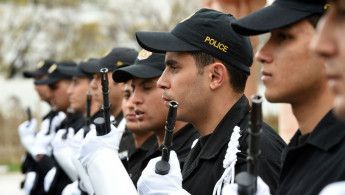Tunisia's public workers win pay boost
An estimated 800,000 public sector workers will see an extra $25 in their monthly pay packets from January, after a deal between unions and government officials was agreed on Tuesday. The average wage in the country is around $330 a month.
Teachers, nurses and police officers won the second public sector wage increase so far this year - which will reportedly cost the public purse around $240 million annually - at a time when the country is mired in recession and faces strong pressure to reduce public spending.
"The economic situation of the country is very difficult, and we have to make sacrifices to keep social tensions calm. But we have to get back to work and productivity to revive the economy," said Prime Minister Hadid Essib.
| The economic situation of the country is very difficult, and we have to make sacrifices to keep social tensions calm - Prime Minister Hadid Essib |
The IMF and 'reforms'
Earlier this month, Christine Lagarde, director of the International Monetary Fund, urged Tunisia to press ahead with economic reforms.
"We agreed on the need to move forward as quickly as possible on the vast number of reforms still to be executed," she said.
Lagarde also said public sector pay in Tunisia is about 13.5 percent of GDP, high compared with many countries in the rest of the world.
Tunisia, currently in recession, is being pressured by its creditors to cut public spending. Its budget deficit is stubbornly high at a projected five percent for this year, down from 5.8 percent last year.
Last month, Tunisia successfully negotiated an extension of its $300 million credit line with the IMF, subject to approval by the international organisation's management, which is expected to come through in late September.
Tourism, a major earner of foreign currency for Tunisia, has been badly affected by two attacks that targeted foreign tourists this year.
Tourist numbers are down by 20 percent compared with the first eight months of 2014, meaning that the country has already received about a million fewer tourists than last year.
In March, 22 were killed in an attack on the Bardo museum in Tunis, and 38 were killed in an attack on a beach resort in Sousse in June.
Tunisians are concerned at the rising cost of living in Tunisia and high unemployment. Rural regions suffer disproportionately as economic development over the past few decades has largely been concentrated in the coastal regions.
Economic grievances, especially relating to the high cost of living and unemployment, were factors behind the outbreak of the Arab Spring protests that removed former President Zine El Abidine Ben Ali in 2011.





 Follow the Middle East's top stories in English at The New Arab on Google News
Follow the Middle East's top stories in English at The New Arab on Google News
![The UAE is widely suspected of arming the RSF militia [Getty]](/sites/default/files/styles/image_330x185/public/2024-11/GettyImages-472529908.jpg?h=69f2b9d0&itok=Yauw3YTG)
![Netanyahu furiously denounced the ICC [Getty]](/sites/default/files/styles/image_330x185/public/2024-11/GettyImages-2169352575.jpg?h=199d8c1f&itok=-vRiruf5)
![Both Hamas and the Palestinian Authority welcomed the ICC arrest warrants [Getty]](/sites/default/files/styles/image_330x185/public/2024-11/GettyImages-2178351173.jpg?h=199d8c1f&itok=TV858iVg)